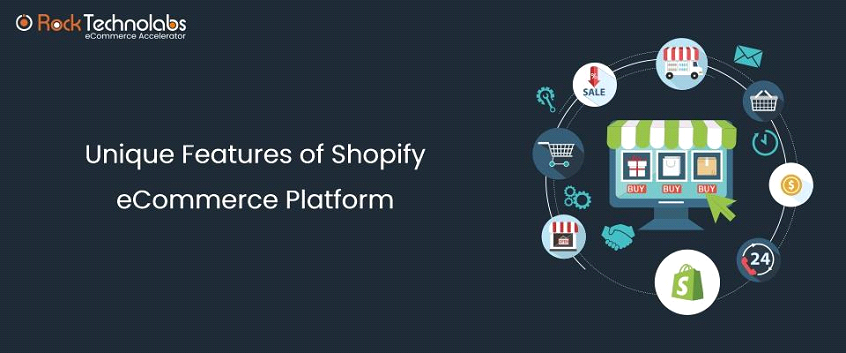9 Unique Features of Shopify Commerce

There are a lot of eCommerce platforms available to build online stores, and choosing the best one for your eCommerce business can be really a tough task. One of the best and known eCommerce platforms is Shopify – but is it the perfect choice and best fit for your business or not?
In this blog, we are going to cover everything from Shopify features to its benefits. Firstly, let’s look at the interesting details about the Shopify platform.
What is Shopify?
Shopify is an eCommerce platform to build online stores. Shopify is one of the best choices if you are thinking of launching your online business because it is the complete e-commerce solution with hundreds of templates to set a feature-enriched online store. Many leading brands have developed their stores on Shopify.
Do You Know What Makes Shopify Unique?
- It offers a 14-day free trial for everyone to build an online store so that you can easily check whether it’s a perfect fit for your business or not and you can easily go through all the features and functionalities of this platform. So if you have products you wish to sell online and make them available to your customers, you can easily create a store with Shopify to do so.
- Shopify helps to build an online eCommerce website with all the functionalities including shopping cart, inventory, and payment. It makes sure that all these processes sync up well and work together flawlessly. It makes the payment process easy by just plugging and playing nearly any payment gateway.
- It offers support of 50 languages and has an integration of 70 payment gateways so it’s very easy for merchants to sell products globally. Shopify offers multiple features for good SEO (Search engine optimization), tools for content management, and Abandoned cart recovery.
Our Recommended: Fun Facts about Shopify Platform
How Does Shopify Work?
Shopify offers a comprehensive eCommerce web builder with a lot of features & functionalities, unique templates, and customization options that make it very easy for merchants to build their online store on their own.
Shopify has a very simple sign-up process, with a free 14-day trial to test out the platform. Thus after 14 days, merchants can either pay for the tools and continue to build the online business or try something else if it’s not the right choice for your business. Templates offered by Shopify are all customized with text, images, videos, and logos to compliment your brand’s look. Once you are set with your store theme, you can start selling your products right away with the platform’s built-in shopping carts.
And if we talk about the front end then users can easily check the categories, search for the products, view the product details, add products to the cart and purchase the product by easily making payment using various payment gateways like online payment or choose Cash on delivery option.
Now let’s dive into the list of Shopify features and benefits. Here you go….
Advantages of Shopify eCommerce
- Better Security
- Personalization option
- Fast Loading Speed
- Mobile Friendly
- Better Customer Service
- User-Friendly Interface
- Shopify App Store
What Are the Key Features of Shopify?
Below listed are some of the unique features of Shopify that can be helpful to you while building your own Shopify store. Just have a look at below Shopify features list:
⦁ Storefront Themes & Customization:
Shopify offers a huge collection of more than 70+ professional & beautiful themes in the Shopify Theme Store which are mobile responsive and are easily customizable.
Thus, building an online store with a beautiful and aesthetic look & feel that fits your brand identity is very simple. Shopify offers a custom domain name and provides you an option to purchase one from Shopify.
⦁ Shipping & Security:
Shopify offers a free SSL certificate for every store so that all the data, page content and transaction details will be secured. Merchants can get automatic shipping rates from major shipping carriers like FedEx, USPS, and UPS. Shopify handles major country and state tax rates automatically based on location.
Shopify can be translated into more than 50 languages as per your needs. Merchants can improve the average order size of their Shopify store by offering free shipping service to customers by setting some price points.
⦁ Abandoned Cart Recovery:
What happens when customers visit your website, add the products to the cart but leave without any purchase? According to Baymard Institute, 69.57% of online shopping carts are abandoned. This means over two-thirds of potential customers leave without purchasing.
Shopify supports Abandoned cart recovery features which help to track these abandonment carts automatically and sends automatic emails to the customers to remind them to complete the purchase at the checkout step. This is one of the effective ways to potentially generate more revenue.
Also Read: How to Improve eCommerce Sales for Your Shopify Store?
⦁ Payment Gateway:
Shopify has integrated with more than 70 payment gateways but also offers its own which is powered by Stripe. So if merchants choose to use their own payment gateway option then they will not be charged any transaction fees and additionally, they will be benefited from lower credit card fees too. Also, there is no need for a merchant account to use.
⦁ Store Management
Shopify allows admin to know more about customers & their shopping habits and encourages customers to repeat shopping by allowing them a guest checkout or account creation option at the time of checkout. Admin can categorize and export the customers’ list based on their purchase history, location, and much more.
Merchants can introduce Shopify dropshipping using the Shopify platform from which they need not require any inventory because Shopify integrates with apps like Ordoro, eCommHub, and Inventory Source, to set up merchant’s dropshipping businesses. Shopify makes the refund process easy where some or all of an order will be refunded when the payment method is used and store inventory will be updated automatically.
⦁ Marketing & SEO:
Shopify offers the best SEO services and helps your customer to find your store using search engines. To encourage sales, try to engage your customers with the option to write SEO-friendly product reviews on your website. You can increase sales and customer loyalty by offering Gift Cards, Discount Codes, Promotions, etc.
Shopify includes a social media integration and provides a variety of sales channels like Facebook shops, Instagram Shops, and Pinterest to sell products.
⦁ Product & Inventory Management:
Shopify allows adding unlimited products to sell in an online store. It offers product variations such as SKU, size, weight, price, etc. Admin can add multiple images to products.
Also, the admin can manage their inventory and track stock counts from the back-end panel. Option of import/export products using CSV files.
⦁ Analytics:
Shopify’s actionable dashboard highlights the key analytics, including orders, sales reports, and online store visitor data. Admin can view the key financial information about the business like the overview of sales, pending sales data, and payment details using finance reports. Products reports offered by Shopify helps admin to analyze and get insights on which products are in demand.
⦁ 24/7 Customer Support:
Shopify has a dedicated support team for customer support. They provide 24/7 customer support by email, phone, or live chat. The response time from Shopify is fairly instant.
In addition, there are a number of community discussion forums, user guides, extensive documentation, and tutorials in the Shopify Help Center, ebooks & webinars in Shopify Compass, plus a range of advanced Shopify University guides.
Do you want to build your shopify store? Ready to take your online eCommerce store business to the next level? Ready to increase the sales of your store? If yes then without any second thought check out the above-specified Shopify features add them to your store as per your business requirement and boost the sales and conversion rates. You can also hire Shopify Expert to help you out in your Shopify store or contact us to learn more.





